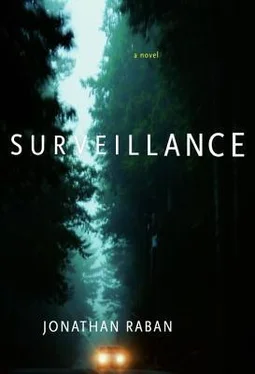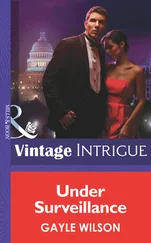“Really?”
Tick, tick, tick, tick, tick. “Which reminds me. Does Alida eat crab?”
“Yes, she does. She doesn’t have too many fads — lamb’s the exception, not the rule. Her favorite soft toy was a lamb. She just hates the thought of eating Larry.”
“There’s a place up near Ebey’s Landing that sells live Dungeness crabs out of a pen. I thought tomorrow morning, we might go get some for lunch — if you felt like driving.”
“I’d love that.”
Minna smiled her shy, winsome, Monroe smile and returned to her knitting. Companionable silence was what she seemed to want, so Lucy turned her gaze to the bay, where Alida, paddling ahead of Augie this time, was confidently setting her own course out to sea.
The windless water was as still and as viscous-looking as a pool of mercury, and the two kayakers shimmered and dwindled like mirages in the haze. Lucy thought of how moments like this had lately become the pattern of life with her daughter: Alida lost to her soccer game, Alida lost to a writing project Lucy was no longer permitted to read, Alida lost to her iPod, and now Alida lost to this aquatic adventure. The sight of the two of them out there roused the familiar pang, half pride, half pain; loss, love, and wonder all balled up together.
She reached for the birdwatching binoculars, then let them be. Better to learn, like Minna, how to keep her place ashore. Yet she couldn’t help wishing that she trusted August Vanags a bit more. Of all the marine life on view at Useless Bay, Augie was the slipperiest fish by far.
BEFORE WALKING the hundred yards to the studio, Tad had left the car at the Excellent Parking lot just off Broadway on Capitol Hill. Now, starting back to the Beetle, he sorted through his meager stock of bare-bones Spanish. Three months of living with Jesus and his Saturday-night special had set him up with the elementary basics of the language, and regular winter breaks with Michael in easygoing, gay-friendly Puerto Vallarta, where Tad appointed himself translator, had brought him to the brink of fluency. His grammar was atrocious, his vocabulary sparse, but his knack for accents sometimes got him mistaken for a native speaker — a half-witted, illiterate native, probably, but better that than a dumb Yanqui tourist.
“Muchas gracias y muy buenas tardes,” Tad said aloud on the street. “Por favor, más despacio.” A passing woman gave him a wide berth.
The kid manning the booth was dark-skinned, an indígeno. Chatting the boy up as he paid and collected his keys, Tad learned that he came from Oaxaca, had lived in L.A., had been in Seattle for one year. But the conversation was like pulling teeth; the boy’s vagrant eyes looked everywhere except at Tad’s face, as if scanning the lot for a route of escape. Still, Tad persevered.
“Charles Lee es la dueño de Excellent Parking, ¿sí?”
“Sí, el Sr. Lee es el dueño.” The boy’s voice was sullen.
“Escucho que es difícil para trabajar por él. El gentes dicen eso.”
With sudden, unexpected force, the boy said, “¡No! ¡No es verdad! El Sr. Lee es un buen jefe: es amable, considerado, muy honesto y siempre nos paga a tiempo. El Sr. Lee nos cae bien. ¿Qué quiere saber del Sr. Lee?”
He looked freaked.
“Okay, muchas gracias. Buenas tardes.”
Back in the car, Tad reached to adjust the rearview mirror and was appalled to see the face of the MagiGro gardener leering back at him. He’d forgotten to wash off his makeup: his forehead was thickly powdered, the bags under his eyes caked in pale blush foundation, his cheeks as red and cheery as those of a department store Santa. Poor kid — he must have thought he was being propositioned by some hideous old queen.
PUNCH, don’t sweep. While Augie put names to the birds overhead, Alida had eyes only for the limpid submarine world below. Augie called the water shallow, but to Alida it appeared miles deep. Each paddle stroke sent refracted sunbeams racing across the sandy sea floor and through the waving meadows of spinach-green eelgrass. The beams lit on bright purple sea stars and the gross sea cucumbers that littered the bottom. A hurrying crab skedaddled along the sand and a fish flashed like the wink of a silver spoon.
Augie had shown her these things in the morning; now she was making them her own. She’d never felt more grown-up, more satisfyingly in charge, than now, scooting the kayak through the water with her paddle. She couldn’t stop smiling. The one thing missing from her happiness was Tad’s presence in the picture. She wished he were standing on shore now, watching her captain her own boat at sea.
“Hey! See the little shark there! He’s coming your way!”
Alida thought Augie was joking, then saw the mottled brown elongated shape glide right beneath her kayak like a winged cigar, so close that she could’ve touched it with her paddle. Little? It was huge — easily as long as she was tall. “ Shark? ” She heard the hiccup of panic in her voice.
“Dogfish. Spiny dogfish. It’s a member of the shark family, like the great white’s baby cousin.”
“Shark! Oh my God, you mean it could attack you?”
“Oh, no. A dogfish is pretty harmless — unless you threaten him, in which case he might give you a nasty bite.”
For Alida, the whole character of the sea had changed on the instant. She was afraid of looking down now, for fear of seeing another gliding monster.
And Augie made it worse. “It’s kind of odd to see one out on his own. That’s why they’re called dogfish — they hunt in packs. See one, you usually see a hundred.”
Packs!
“They can live for fifty years, maybe even a hundred, which is a helluva great age for a fish. Hey, there’s another! I thought so.”
She didn’t dare look.
“Scavengers of the sea, they’re called, and they do a fine job of cleaning up.”
Shakily, she said, “Can we go back now?”
“Sure, but we still have a good half hour left. We could follow the sharks.”
Terrified of losing her balance, Alida turned her kayak toward the beach and began to paddle fast and splashily, sweeping not punching, through water squirming with hungry hundred-year-old sharks, their bald, underslung jaws opening and shutting to bare repulsive yellowed fangs.
“Alida!”
She was far ahead of Augie now.
“Alida, it’s okay! Really, it’s okay! They’re just dogfish. There’s nothing—”
But she was deaf to anything he might say: she was paddling for her life.
“POOR KID — she thought she was in Jaws 4, and it was all my stupid fault.” Augie was making martinis. Alida, who’d come back white-faced, lower lip trembling, had taken herself up to her room to do her math homework. Minna, refusing Lucy’s offer to help, was in the kitchen doing something complicated and French for dinner.
“I like mine dry,” Augie called from within the house.
“So do I. My dad used to say that one bottle of vermouth should last a decade, if not two.”
“Man after my own heart. Olive? Twist? Both?”
“I’d like a twist, thanks.”
He was quite the bartender, buttling the martinis out to the patio on a silver tray.
“I’m so sorry about Alida.”
Lucy laughed, trying to put his mind at rest. “It’s a good lesson to learn, that there are sharks in the sea.”
“Before we saw the dogfish, she was happy as a clam.”
“How is it that clams got their reputation for proverbial happiness?”
“I don’t know — all that squirting, maybe? That looks pretty much like fun.” Augie peered into the depths of the house for a moment, found a half-smoked cigarette in his shirt pocket, and lit up.
Читать дальше












